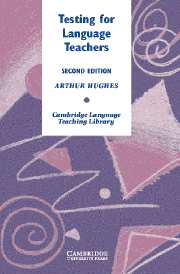Book contents
- Frontmatter
- Contents
- Acknowledgements
- Preface
- 1 Teaching and testing
- 2 Testing as problem solving: an overview of the book
- 3 Kinds of tests and testing
- 4 Validity
- 5 Reliability
- 6 Achieving beneficial backwash
- 7 Stages of test development
- 8 Common test techniques
- 9 Testing writing
- 10 Testing oral ability
- 11 Testing reading
- 12 Testing listening
- 13 Testing grammar and vocabulary
- 14 Testing overall ability
- 15 Tests for young learners
- 16 Test administration
- Appendix 1 The statistical analysis of test data
- Appendix 2 Item banking
- Appendix 3 Questions on the New Zealand youth hostels passage
- Bibliography
- Subject Index
- Author Index
- Frontmatter
- Contents
- Acknowledgements
- Preface
- 1 Teaching and testing
- 2 Testing as problem solving: an overview of the book
- 3 Kinds of tests and testing
- 4 Validity
- 5 Reliability
- 6 Achieving beneficial backwash
- 7 Stages of test development
- 8 Common test techniques
- 9 Testing writing
- 10 Testing oral ability
- 11 Testing reading
- 12 Testing listening
- 13 Testing grammar and vocabulary
- 14 Testing overall ability
- 15 Tests for young learners
- 16 Test administration
- Appendix 1 The statistical analysis of test data
- Appendix 2 Item banking
- Appendix 3 Questions on the New Zealand youth hostels passage
- Bibliography
- Subject Index
- Author Index
Summary
This chapter begins by considering how we should specify what candidates can be expected to do, and then goes on to make suggestions for setting appropriate test tasks.
Specifying what the candidate should be able to do
Operations
The testing of reading ability seems deceptively straightforward when it is compared to, say, the testing of oral ability. You take a passage, ask some questions about it, and there you are. But while it is true that you can very quickly construct a reading test, it may not be a very good test, and it may not measure what you want it to measure.
The basic problem is that the exercise of receptive skills does not necessarily, or usually, manifest itself directly in overt behaviour. When people write and speak, we see and hear; when they read and listen, there will often be nothing to observe. The challenge for the language tester is to set tasks which will not only cause the candidate to exercise reading (or listening) skills, but will also result in behaviour that will demonstrate the successful use of those skills. There are two parts to this problem. First, there is uncertainty about the skills which may be involved in reading and which, for various reasons, language testers are interested in measuring; many have been hypothesised but few have been unequivocally demonstrated to exist. Second, even if we believe in the existence of a particular skill, it is still difficult to know whether an item has succeeded in measuring it.
- Type
- Chapter
- Information
- Testing for Language Teachers , pp. 136 - 159Publisher: Cambridge University PressPrint publication year: 2002



